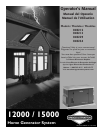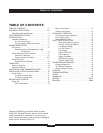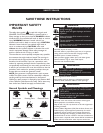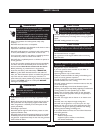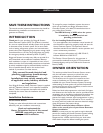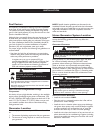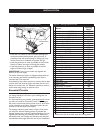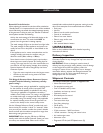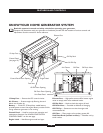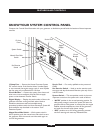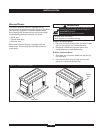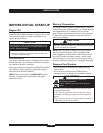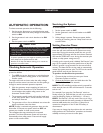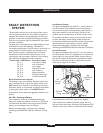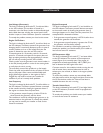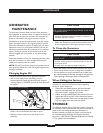
INSTALLATION
8
Essential Circuit Selection
When selecting the essential circuits that will be switched to
“Standby Power,” it is important that the sum of the combined
circuit loads does not exceed the wattage/amperage capacity
of the generator.To help you with your selection of essential
circuits,please consider the following:
Add up the total wattage of all electrical devices to be
connected at one time.This total should NOT be
greater than the generator’s wattage capacity.
The rated wattage of lights can be taken from light bulbs.
The rated wattage of tools, appliances and motors can
usually be found on a data plate or decal affixed to the
device.
If the appliance, tool or motor nameplate does not list
wattage, multiply volts times the ampere rating to
determine watts (Volts x Amps = Watts).
Some electric motors (induction types) require about
three times more watts of power for starting than for
running.This surge lasts for only a few seconds. Be sure
you allow for this high starting wattage when selecting
electrical devices that will be energized by the Home
Generator System:
• Figure the watts required to start the largest motor.
• Add that to the total running watts of all other
connected loads.
This Briggs & Stratton Home Generator System
complies with the following “stationary standby
power rating”:
The standby power rating is applicable for supplying power
for the duration of normal power interruption. NO
sustained overload capability is available for this rating.
This rating is applicable to installations served by a
reliable normal utility source.This rating is only applicable
to variable loads with an average load factor of 80% of
the standby rating.The standby rating is only applicable
for optional standby power where the generator set
serves as the backup to the normal utility source.
Use the “Wattage Reference Guide” provided and mark
those circuits you consider “critical” or “essential”. Make
sure you and your installer consider the system’s altitude
above sea level and the ambient temperature range when
determining total generator load.
IMPORTANT:When using the 100 Amp or 200 Amp
transfer switch with the Home Generator System,you must
turn off any non essential loads.Failure to turn off non
essential loads could overload the generator causing it to shut
down. Some examples of non essential loads are as follows:
• Pool pump
• Hot tub
• Electric hot tub and/or pool heaters
• Central air conditioners
• Electric hot water heaters
• Electric range and/or oven
• Arc welder
• Non essential electric heaters
UNPACKING
Refer to the Installation Manual for detailed unpacking
instructions, if desired.
Delivery Inspection
After removing the carton, carefully inspect the Home
Generator System for any damage that may have occurred
during shipment.
IMPORTANT: If loss or damage is noted at time of
delivery, have the person(s) making delivery note all damage
on the freight bill and affix his signature under the
consignor's memo of loss or damage. If loss or damage is
noted after delivery, separate the damaged materials and
contact the carrier for claim procedures. Missing or
damaged parts are not warranted.
Shipment Contents
The Home Generator System is supplied with:
• Home Generator System
• Pre-attached mounting pad
• One 24” flexible hook-up hose
• Installation and start-up manual
• Operator’s manual
• Illustrated parts list manual
• Installation checklist
• Two access door keys
• Four lifting hole plugs
• Oil fill spout
• One spare 15A fuse
• 2 Pole connector - 240V from house
• 10 Pole connector - Sensing and control wires
• Air intake engine cover
• Alternator cover
• Diagnostic LED kit (red LED/plate/screws (2))



